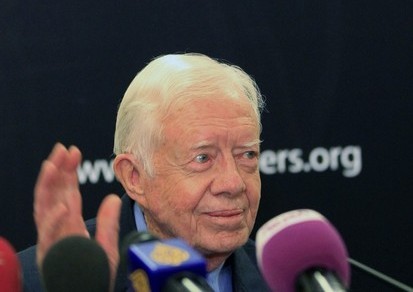Sudan is willing to withdraw its troops from Abyei, President Carter
May 27, 2012 (KHARTOUM) –President Omer Hassan al-Bashir is ready to withdraw Sudanese troops from Abyei, announced the former American president Jimmy Carter in Khartoum on Sunday.

The two neighbours are expected to meet on Tuesday 29 May in line with an African Union road map endorsed by the UN Security Council demanding the end of hostilities, withdrawal of troop from Heglig and Abyei and implementation of border security agreements.
“President Bashir told us he had notified the negotiators that (he was) willing to withdraw his troops from Abyei. We believe this is a major step forward,” President Carter said during a press conference held in Khartoum, after The Elders’ meeting with President Bashir.
The implementation of the Temporary Arrangements for the Administration and Security of the Abyei Area of 20 June 2011, is one of different security deals the parties have to discuss in Addis Ababa next Tuesday.
While Juba pulled out its 700 soldiers, Khartoum refuses to withdraw its troops from Abyei saying South Sudan does not want to appoint a new administration instead of the military administrator assigned since the seize of Abyei in May 2011 and the dissolution of the Abyei administration.
If true, the withdrawal of Sudanese troops will make it easier for the Africa Union mediation to commit the parties to enforce the other security agreements they have already signed.
The other signed security deals are: the Agreement on Border Security and the Joint Political and Security Mechanism (JPSM) of 29 June 2011, the Agreement on the Border Monitoring Support Mission of 30 July 2011, the decisions of the JPSM of 18 September 2011, the Memorandum of Understanding (MoU) on Non-Aggression and Cooperation of 10 February 2012.
Sudan wants South Sudan to stop its support to Darfur rebels and withdraw the fighters of the Sudan People’s Liberation Movement – North (SPLM-N) from the Nuba Mountains, South Kordofan and Blue Nile where they have been fighting against the Sudanese army since June 2011.
Carter said the lack of trust on both sides of the border has contributed to the recent escalation. “Building confidence and constructive relations between Sudan and South Sudan is urgent.”
He further said they requested the Sudanese president to “display the statesmanship that we know he is capable of as demonstrated last year in the peaceful facilitation of the referendum enabling the independence of South Sudan.”
Carter and Brahimi plan to meet President Salva Kiir and the African mediation team led by Thabo Mbeki during the coming weeks but no date was given.
Brahimi who welcomed the resumption of talks between Sudan and South Sudan in Addis Ababa urged the two parties to reach an agreement stressing that the people of the two countries were suffering from the economic consequences of this crisis.
“The economic impact of the current crisis in relations between the two sides is already being felt in the North and South, and unless there is some improvement, the suffering of the people will only get worse,” he told reporters.
The two figures urged Bashir to meet Salva Kiir personally saying such meeting will help to end the current crisis between the two countries.
Bashir refused to meet Kiir at a meeting scheduled to take place at the beginning of April in Juba to sign an agreement on four freedoms allowing citizens of both countries to enjoy “freedom of residence, freedom of movement, freedom to undertake economic activity and freedom to acquire and dispose property.
The visit was called off due to conflict around the Heglig oil region, which led to South Sudan’s 10-day seizure of the area from 10-20 April.
The Elders are independent leaders using their collective experience and influence for peace, justice and human rights worldwide. The group was founded by Nelson Mandela in 2007.
(ST)
